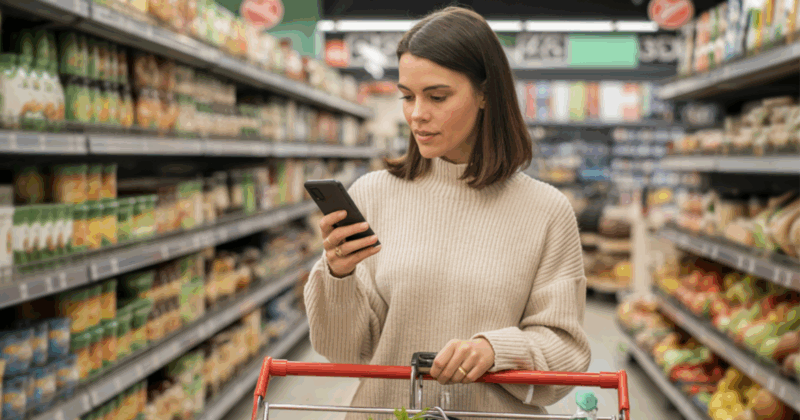Money leaves a long shadow.
Even if your bank account looks different today, the habits you built while growing up can follow you everywhere—especially in everyday places like the grocery store.
I grew up lower middle class, and while things are more comfortable for me now, I still catch myself doing some of these behaviors. They’re automatic.
And when I see others doing them, I can’t help but wonder if we share a similar background.
Here are seven grocery store habits that often reveal someone’s past.
1. Calculating the total before you reach the register
If you grew up poor, you probably know the feeling of scanning every price tag and running mental math as you go.
I used to keep a running tally in my head because going over budget wasn’t just inconvenient—it was embarrassing. Nobody wanted to be the person holding up the line while deciding which item to put back.
Even now, with more breathing room in my budget, I still find myself estimating totals before checkout. It’s less about need and more about muscle memory.
2. Buying generic over brand names every time
When I was a kid, brand names were a luxury. We didn’t buy Cheerios—we bought the bagged oat rings that looked almost the same.
That habit sticks. Even now, I’ll grab the store brand over the big-name version without thinking. The logic is hard to shake: why pay $3 more for the same thing?
Sure, sometimes brand-name products genuinely taste better. But growing up without much money conditions you to automatically assume the cheaper version will “do just fine.”
And in many cases, it really does.
3. Putting things back at the last second
If you’ve ever seen someone unload groceries at the register and suddenly slide a couple of items aside, that’s a telltale sign.
I did this countless times growing up. Sometimes it was because my mental math was off, other times because I was worried we couldn’t cover the extra few dollars.
Even now, I’ll catch myself hesitating with something in the cart, asking, “Do I really need this?” The fear of overspending doesn’t fully leave you, even when you technically have enough.
This is what behavioral economists call loss aversion—we feel the pain of loss more strongly than the pleasure of gain. For people who grew up poor, that fear of financial loss gets wired deep.
4. Stocking up like every sale is the last one
When money was tight, sales felt like lifelines. Buy one, get one free? That wasn’t just a deal—it was a survival strategy.
I still feel a rush when I see discounts. My pantry ends up with way more pasta or canned beans than I actually need. Somewhere in the back of my mind is the thought: “What if I can’t afford it later?”
Growing up poor means scarcity thinking never completely leaves. Even in abundance, you prepare for drought.
5. Avoiding fresh produce for fear it will go bad
I remember my mom telling me not to buy too much fruit because it “goes bad fast.”
Fresh produce was risky. If we didn’t eat it in time, it meant wasted money—something we couldn’t afford.
That habit lingers. Even now, I often buy frozen vegetables or smaller amounts of fresh produce than I really need. Part of me still feels like buying too much fresh food is reckless, even though I can easily replace it.
It’s a strange echo of childhood logic: better to avoid waste than enjoy abundance.
6. Choosing smaller packages even if the larger one is cheaper per unit
This one feels irrational to people who never worried about money.
Why buy the 24-pack of toilet paper that costs less per roll when you can grab the smaller pack for half the upfront price?
For families living paycheck to paycheck, it wasn’t about the best deal in the long run. It was about what we could afford that week.
I still catch myself hesitating at bulk buys, even though logically I know they save money over time. Old habits die hard.
7. Treating “extras” like a big decision
When I was young, throwing cookies or ice cream into the cart wasn’t automatic—it was a discussion.
“Can we afford it this week?”
I can buy them without thinking now, but sometimes I’ll still pause in the aisle as if I need to justify it.
If you grew up poor, small luxuries at the grocery store never felt small. They felt like major decisions.
And sometimes, they still do.
Final thoughts
Growing up poor shapes the way you see money—and the grocery store is where those habits show most clearly.
For me, these behaviors are part survival strategy, part comfort zone. I know I don’t need to count every penny or avoid the bigger bag anymore, but some part of me still does it anyway.
If you found yourself nodding along, you’re not alone. These habits are hardwired. And while they can feel limiting, they also carry a hidden strength: awareness. You know the value of money, probably better than most.
And that’s not something to be ashamed of. It’s something to carry with you—wisely, not fearfully—into every stage of life.
- Preferring solitude over constant socializing is a subtle sign of these 7 unique traits - November 7, 2025
- 7 things in life you should always keep to yourself no matter how comfortable you feel around someone - November 7, 2025
- 10 phrases people with poor social skills often use in everyday conversation - November 7, 2025
